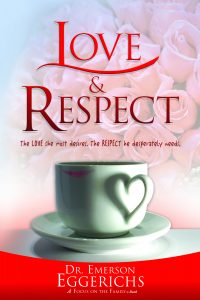Photos by http://www.ibelieveinlove.com/first-fight-taught-marriage/
These days, it seems more and more couples are opting out of marriage. Certainly, two people trying to make it through life together is not easy, to say the least, and it will help to increase understanding on what makes things “work.”
In his book, Love and Respect (Integrity, 2004), Dr. Emerson Eggerichs quotes a paraphrase of 1 Corinthians 7:28: “If you marry, you have not sinned, but you will have trouble.” The Bible is very realistic. Marriage is difficult because men and women are so different, and both partners are responsible for the health of the relationship.
One such difference forms the centerpiece of the book: while the basic need of the wife is to be loved unconditionally by her husband, a husband’s deeper need is to be respected by his wife. That a husband’s deeper need is to be respected by his wife was jolting to me (Michelle); I had never realized that prior. We often assess how well a marriage is going only in terms of how much love is demonstrated or how well communication is going on, but the introduction of respect as a relevant dynamic in the marriage could provide insight to many a marital conflict.
But equally important is the fact that husband and wife react and respond to each other’s needs. A woman responds with respect to a man who loves her. We have proven this time and again in our marriage. The wife responds with greater respect for her husband when she is assured of is love. In the same way, the husband responds more tenderly with love towards his wife when he is treated respectfully.
Eggerichs describes the state of marriage in terms of three different “cycles”, depending on how each spouse is reacting or responding to each other’s core needs.
When the husband does not feel respected by his wife, he tends to withhold love from her; and when the wife does not feel loved by her husband, she has a hard time respecting him. Husband and wife get trapped in this cycle of reacting to one another rather than responding to each other’s needs. This subtle undercurrent causes tension build-up in the marriage. This is what Eggerichs calls the “Crazy Cycle”: Without love, she reacts without respect. Without respect, he reacts without love.
The cycle goes on and on, spinning tirelessly and so painfully to make us want to get off. It would be great if we just want to get off the crazy cycle itself, but often, when we can’t put a finger on the problem, we want to get out of the marriage itself.
The good news is that we can get off the “Crazy Cycle”. God’s Word is wise in its admonition in Ephesians 5:22 culminating here in verse 33: “…let each one of you love his wife as himself, and let the wife see that she respects her husband.” There is no question that women expect their husbands to respect them, and that men desire to be loved and cared for by their wives, but it means so much more to husbands when their wives respect them, and to wives when they are secure in their husbands’ love.
Today’s generation runs after love as the ecstasy of emotion. But true love is much more than that. Love is commitment expressing itself in behavior; feelings are just the result. That is why God commands husbands to love their wives in Ephesians 5. Eggerichs explains how husbands can show love to their wives using the acronym COUPLE:
Closeness—Be close to her, and not just for sex.
Openness—Be open to her; listen and be interested
Understanding—Don’t try to fix her; just listen and be considerate.
Peacemaking—There is power in saying “I’m sorry.”
Loyalty—Always assure her of your loyalty and commitment to her.
Esteem—Honor and cherish her.
On the other hand, while wives expect unconditional love from their husbands, the challenge for wives is this: would it be possible to grant husbands unconditional respect instead of having them earn it? To remind wives to practice and express respect to their husbands, Eggerichs uses the acronym CHAIRS:
Conquest—Appreciate his desire to work and achieve.
Hierarchy—Thank him for his desire to protect and provide.
Authority—Acknowledge his desire to serve and to lead.
Insight—Appreciate his desire to analyze and counsel.
Relationship—Value his desire for shoulder-to-shoulder friendship.
Sexuality—Respond to his need for sexual intimacy.
These expressions of respect help husbands emerge with hearts that are full, confident, and whole – and motivated to love.
When spouses commit to break the cycle so that husbands love their wives and wives respect their husbands, Eggerichs says that they are freed to be in a new Energizing Cycle: his love motivates her respect, and her respect motivates his love. And the ultimate goal, as we obey God’s command in Ephesians 5:20-33, is the Rewarded Cycle, where his love blesses regardless of her respect, and her respect blesses regardless of his love.
Where do you begin? Who must take the initiative? What if my spouse doesn’t take the initiative? The book challenges us: the one who is more mature can initiate breaking the Crazy Cycle. Would that be you?
May God bless your marriage today as you obey Him.
Love and Respect is available in bookstores nationwide.

Related Posts
-
Keep the Love Alive: Date Your Spouse for Life
Marriage does not have to fall into a boring rut. Remember that it takes a…
-
In Sickness and In Health
One night, in October of 1991, I visited a friend about to go through spinal…
-
Hope for Marriage in a Changing World
One year since his interview with FamilyWiseAsia.com, revered marriage counselor, Rev. Clem Guillermo, has since…

Family, work, and ministry teammates Boris and Michelle Joaquin have been married 17 years and are still learning how to grow together in oneness. They have worked together on several levels, currently with United Neon affiliate companies Breakthrough Leadership Management Consultancy Inc. where Boris is CEO, and FamilyWiseAsia, where Michelle is editor; in church ministry, where they mentor a group of young professionals collectively called Hagios; and in their favorite collaboration — raising daughters Ysobel, 16 and Julia, 10.
Related Posts
-
Keep the Love Alive: Date Your Spouse for Life
Marriage does not have to fall into a boring rut. Remember that it takes a…
-
In Sickness and In Health
One night, in October of 1991, I visited a friend about to go through spinal…
-
Hope for Marriage in a Changing World
One year since his interview with FamilyWiseAsia.com, revered marriage counselor, Rev. Clem Guillermo, has since…




